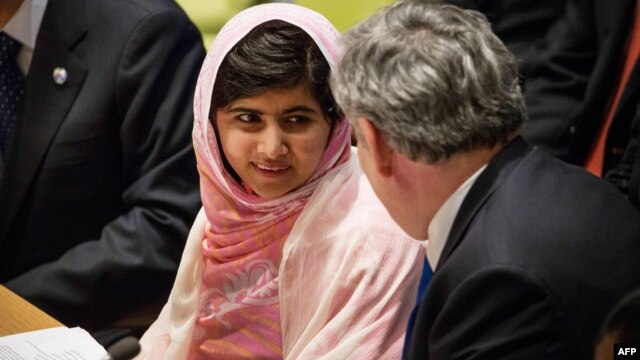
Malala Yousafzai speaks to former British PM Gordon Brown before speaking at the U.N. Youth Assembly, July 12, 2013.
UNITED NATIONS — Malala Yousafzai, the Pakistan girl shot by the Taliban in 2012 for being an outspoken voice for girls' education, marked her 16th birthday Friday by giving a speech before U.N. Secretary-General Ban Ki-moon and more than 500 of her peers at the world deliberative body's New York headquarters.
Addressing the youth assembly, Yousafzai said the gunmen could not silence her because knowledge and education is more powerful than their bullets, adding that Friday's event, which has been referred to as "Malala Day," was really about the much broader cause of children's rights worldwide.
“Do remember one thing, 'Malala Day' is not my day," she said, clothed in a pink shalwar khamez and a shawl that belonged to the late Pakistani Prime Minister Benazir Bhutto. "Today is the day of every woman, every boy, and every girl who have raised their voice for their rights."
Yousafzai was grievously wounded just nine months ago in Pakistan's Swat Valley, shot in the left side of her head at by Taliban gunmen who also killed two of her friends. The young rights activist was accompanied to the event, her first major public speech since the shooting, by her parents and two brothers.
“Terrorists thought they would change my aims and stop my ambitions, but nothing changed in my life except this: weakness, fear and hopelessness died," she said. "Strength, power and courage was born. I am the same Malala."
Yousafzai came to the U.N. to deliver to the secretary-general a petition signed by more than four million people, calling on the international assembly to fund new teachers, schools and books, and calling on governments to ensure free and compulsory education worldwide for every child. She urged a global struggle against illiteracy, poverty and terrorism.
“Let’s pick up our books and our pens," she said. "They are our most powerful weapons. One child, one teacher, one book and one pen can change the world. Education is the only solution. Education first!”
Ban said 57 million children around the world do not attend primary school. Many of them live in conflict zones and most are girls. He reflected on attacks on schools around the world, most recently in Nigeria, where terrorists killed 29 students.
"No child should have to die for going to school," said Ban. "Nowhere should teachers fear to teach or children fear to learn. Together, we can change this picture."
Last September, Ban launched the Global Education First Initiative with the goal of putting every child in school by the end of 2015 and improving the quality of learning.
According to reports by Reuters, research by the U.N. cultural agency UNESCO indicates that Pakistan has 5 million children out of school, a number only surpassed by Nigeria, which has more than 10 million children out of school, most of whom are girls. |
|
